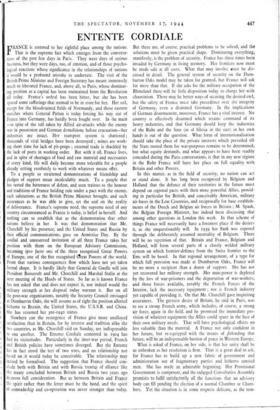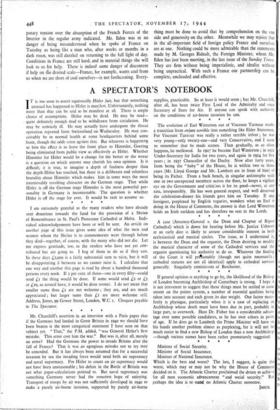ENTENTE CORDIALE
FRANCE is restored to her rightful place among the nations. That is the supreme fact which emerges from the conversa- tions of the past few days in Paris. They were days of serious business, but they were days, too, of emotion, and of those psycho- logical reactions whose significance in the relationships of nations it would be a profound mistake to underrate. The visit of the British Prime Minister and Foreign Secretary has meant immensely much to liberated France, and, above all, to Paris, whose dominat- ing position as a capital has been maintained from the Revolution till today. France's ordeal has been bitter, but she has been spared some sufferings that seemed to be in store for her. Her soil, except for the bloodstained fields of Normandy, and those eastern marches where General Patton is today forcing his way out of France into Germany, has hardly been fought over. In the main —in spite of the toll taken by Allied air-attacks while the enemy was in possession and German demolitions before evacuation—her industries are intact. Her transport system is shattered ; thousands of vital bridges have been destroyed ; mines are work- ing short time for lack of pit-props ; external trade is shackled by the lack of ports in working order. But with it all, France lives, and in spite of shortages of food and raw material and necessaries of every lthad, life will daily become more tolerable for a people already setting resolutely to work with whatever means offer.
To a people so straitened demonstrations of friendship and pledges of support mean incalculably much. To a people that has tasted the bitterness of defeat, and seen traitors to the honour and traditions of France holding rule under a pact with the enemy, such salutations as the British Prime Minister brought, and such assurances as he was able to give, set the seal on the reality of deliverance. France's supreme need, the supreme need of any country circumstanced as France is today, is belief in herself. And nothing can so establish that as the demonstration that other nations believe in her. It was that demonstration that Mr. Churchill by his presence; and the United States and Russia by their official communications, gave on Armistice Day. By the cordial and unreserved invitation of all three France takes her position with them on the European Advisory Commission, becoming ipso facto one of the three recognised Great Powers of Europe, one of the five recognised (treat Powers of the world. From that various consequences flow which have not yet taken formal shape. It is hardly likely that General de Gaulle will join President Roosevelt and Mr. Churchill and Marshal Stalin at the next meeting of the Heads of States. So far as is known France has not asked that and does not expect it, nor indeed would the military strength at her disposal today warrant it. But on all the post-war organisations, notably the Security Council envisaged at Dumbarton Oaks, she will assume as of right the position allotted hitherto to Britain, the United States, the U.S.S.R. "and China. She has resumed her pre-194o status.
Nowhere can the resurgence of France give more unalloyed satisfaction than in Britain, for by interest and tradition alike the two countries, as Mr. Churchill said on Sunday, are indispensable to one another. The Entente Cordiale cemented in 1904 has had its vicissitudes. Particularly in the inter-war period, French and British policies have sometimes diverged. But the Entente has in fact stood the test of two wars, and no relationship not based on .it would today be conceivable. The relationship may indeed be formalised. The suggestion that France should con- clude both with Britain and with Russia treaties of alliance like. the treaty concluded between Britain and Russia two years ago deserves full consideration. But as between Britain and France the spirit rather than the letter must be the bond, and the spirit of comradeship and co-operation was never stronger than today. But there are, of course, practical problems to be solved, and the solutions must be given practical shape. Dominating everything, manifestly, is the problem of security. France has three times been invaded by Germany in living memory. Her frontiers now must be made safe at all costs. What that may involve must be dis- cussed in detail. The general system of security on the Dum- barton Oaks model may be taken for granted, but France will ask for more than that. If she asks for the military occupation of the Rhineland there will be little disposition today to charge her with chauvinism. There may be better ways of securing the desired end, but the safety of France must take precedence over the integrity of Germany, even a disarmed Germany. In the implications of German disarmament, moreover, France has a vital interest. No country is effectively disarmed which retains command of its heavy industries, and that Germany should keep the industries of the Ruhr and the Saar (or of Silesia in the east) in her own hands is out of the question. What form of internationalisation should take the place of the private interests which prevailed till the State ousted them for war-purposes remains to be determined, but what equity demands, and what appears to have been readily conceded during the Paris conversations, is that in any new regime in the Ruhr France will have her place on full equality with Britain and other Powers.
In this matter, as in the field of security, no nation can act or stand alone. It has long been recognised by Belgium and Holland that the defence of their territories in the future must depend on regional pacts with their more powerful Allies, provid- ing in particular for British, and conceivably American, military air-bases in the Low Countries, and reciprocally for base establish- ments of the Dutch and Belgian air forces in Britain ; M. Spaak, the Belgian Foreign Minister, has indeed been discussing that among other questions in London this week. In that scheme of things France will necessarily have a foremost place if she desires it, as she unquestionably will. In 1939 her flank was exposed through the deliberately assumed neutrality of Belgium. There will be no repetition of that. Britain and France, Belgium and Holland, will form several parts of a closely welded military system on which frontier-defence from the Swiss frontier to the Ems will be based. In that regional arrangement, of a type for which full provision was made at Dumbarton Oaks, France will be no more a recipient than a donor of support. She has not yet recovered her military strength. Her man-power is depleted by the loss of war-prisoners and the deportation of war-workers, and those forces available, notably the French Forces of the Interior, lack the necessary 'equipment ; nor is French industry yet capable of providing it. On that Mr. Churchill gave inspiriting assurances. The greatest desire of Britain, he said in Paris, was to see a strong French army, which includes, of course, a strong air force, again in the field, and he promised the immediate pro- vision of whatever equipment the Allies could spare in the face of their own military needs. That will have psychological effects no less valuable than the material. A France not only confident in her future, but re-equipped with the means of ;defending that future, will be an indispensable bastion of peace in Western Europe.
What is asked of France, on her side, is that her unity shall be as unbroken as her resolution is firm. That is a great deal to ask, for France has to build up a new fabric of government and administration out of fragmentary parties and hitherto untried men. She has made an admirable beginning. Her Provisional Government is competent, and the enlarged Consultative Assembly promists to fulfil satisfactorily all the functions that an advisory body can fill pending the election of a normal Chamber or Cham- bers. Yet the situation is in some respects delicate, as the tem- porary tension over the absorption of the French Forces of the Interior in the regular army .indicated. Mr. Eden was in no danger of being misunderstood when he spoke of France on Tuesday as being like a man who, after weeks or months in a dark room, was still dazzled on returning to the full light of day. Conditions in France are still hard, and in material things she will look to us for help. There is indeed some danger of discontent if help on tfie desired scale—France, for example, wants coal from us when we are short of coal ourselves—is not forthcoming. Every- thing must be done to avoid that by comprehension on the one side and generosity on the other. Meanwhile we may rejoice that in the all-important field of foreign policy France and ourselves are at one. Nothing could be more admirable than the statements made by M. Georges Bidault, the Foreign Minister; whom Mr. Eden has just been meeting, in the last issue of the Sunday Times. They are firm without being imperialistic, and idealist without being unpractical. With such a France our partnership can be complete, unclouded and effective.



























 Previous page
Previous page